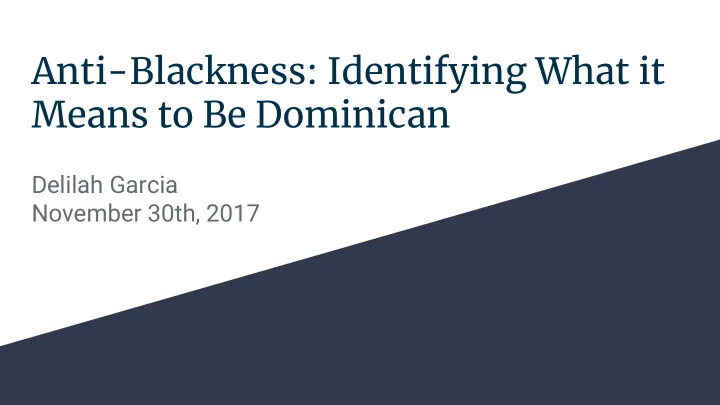

Anti-Blackness: Identifying What it Means to Be Dominican Delilah Garcia November 30th, 2017
By looking at the history, culture, and political climate of the Dominican Anti-Blackness in Republic, this project explores how Dominican Culture views and attitudes of anti-blackness within the people and descendents of the Dominican Republic affect their identity and their sense of self, how this is changing, and what still needs to be done.
A small group discussion was held between three members of the Sociedad Estudiantil Dominicana here The Discussion at Rutgers University, to discuss their views, experiences and feelings about the anti-blackness amongst Dominicans. I asked them a list of ten questions, although different/new questions and topics came up within the discussion. Special Thanks to: Rhemmy De La Rosa, President Ismelisa Rivas , Vice President Michael Soto , Parliamentarian
History Culture ● Negative/Positive connotations ● War between the Dominican and meanings Republic and Haiti ● How music plays a part ● Dictator Trujillo’s influence in ● Beauty and Hair the 1930’s ● African Influence Politics Identity ● The Deportation of Haitians ● Dominican is who you are, in the Dominican Republic not what you are ● Accepting ourselves
Miss Rizos - Carolina Conteras has brought change to the Dominican Republic when she opened up the first Afro-Latina curly haired Salon in the capital Santo Realness and a Domingo. Changing Nation Afro-Latina/Dominican bloggers, like MonicaStyleMuse, are using social media to change the ideals of what a ‘Latina’ is suppose to look like. Women’s Leadership starts with accepting and loving yourself entirely.
During the discussion, it was brought up a couple of times how our views as younger individuals are different from our parents’ (the older generation) view The Next on blackness and how we our more accepting of ourselves. Generation Education and ignorance within the Dominican Republic, as well as in the United States, was also brought up. It was mentioned how many Dominicans, both on the island and in the states, do not learn about their own African ancestry, and so they only go based off what they hear from others. For future Leadership Scholars, or Afro-Latinos in general, the next focus should be on educating those who might not be exposed to their own cultural ancestry.
While my project was done on a small scale, it brought to light how young Dominicans think about their cultural The Importance of identity in terms of race, or even, how Personal Narratives they might not think about it. It is important to speak and reflect on one’s own experiences as it brings an understanding to a certain topic, as well as being able to relate to those similar to you. It also brings these important issues to light and brings about an awareness.
Austerliz, Paul. Merengue: Dominican Music and Dominican Identity. 1997 Cadena, Daniela. This Art Series Was Born From the Micro-Agressions Afro-Latinxs Often Deal With. buzzfeed, November 8, 2017 . Candelario, Ginetta E. B. Black behind the Ears: Dominican Racial Identity from Museums to Beauty Shops . Durham: Duke UP, 2007. Print. Castillo, Mariano. Faces of a Divided Island: How centuries of racism and fear shaped the Bibliography people of two nations – and echo through a modern-day crisis. CNN, April 13, 2016 Garcia, Roberto C. Hiding Black Behind the Ears: On Dominicans, Blackness, and Haiti. Gawker . N.p., n.d. Web. 07 Apr. 2017. Gomez, Jasmine. Afro-Latina Beauty Vloggers Talk About Identity – TeenVogue ., 2017 Pimental, Manuel (@ThatsDominican).(2015, June 26). Los Dominicanos Somos Racistas? (Videofile).Retrievedfrom h ttps://medium.com/yuniversity-interns/we-dominicans-are-racist-8481771cc385 Restrepo, Claudia et al (@PeroLike).(2017, Nov 12). What Afro-Latinos Want You To Know, (Video file). Retrieved from https://www.youtube.com/watch?v=ZX7EmIYdeKA Sagas, Ernesto. "Haiti: Antihaitianismo in Dominican Culture." Haiti: Antihaitianismo in Dominican Culture . N.p., n.d. Web. 07 Apr. 2017. Simmons, Kimberly E . Reconstructing Identity and the African Past in the Dominican Republic. 2009. Tavernier, Latoya A. "The Stigma of Blackness: Anti-Haitianism in the Dominican Republic." Socialism and Democracy 22.3 (2008): 96-104. Web. Gates, Henry L. Dominicans in Denial. theroot, August 5, 2011.
Recommend
More recommend